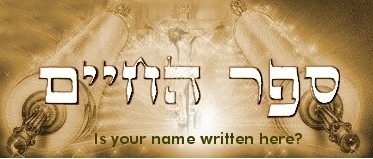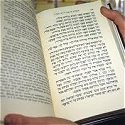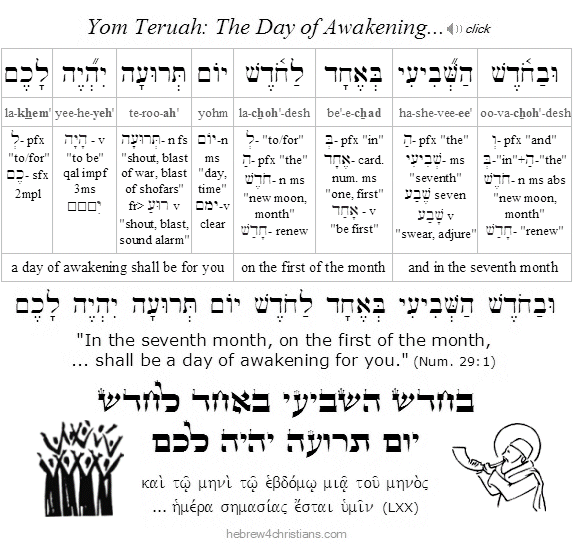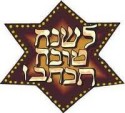| There are many things the Christian can learn from the Jewish observance of Yamin Nora'im and Rosh Hashanahthat are helpful in our walk as talmidim (followers, students) of the Mashiach Yeshua: First, the LORD God is indeed the King of all the earth, our Creator and Redeemer. He is Melech Gadol al-kol-ha'aretz, (מֶלֶךְ גָּדוֹל עַל־כָּל־הָאָרֶץ), a "great King over all the earth" (Psalm 47:2). Though Christians should acknowledge His righteous rule and Kingship at all times, Rosh Hashanah is a "sanctified reminder" of God's creative authority in our lives. Yeshua (Jesus) is called the Mashiach (מָשִׁיחַ), a term that denotes His Kingly dignity and royalty. He is also the Creator and Sustainer of all creation (Col. 1:16). He is coming to rule and reign from Jerusalem (Zion) in the near future. Christians will be judged according to their deeds of service (2 Cor. 5:10) and the world system. e is also the Creator and Sustainer of all creation (Col. 1:16). He is coming to rule and reign from Jerusalem (Zion) in the near future. Christians will be judged according to their deeds of service (2 Cor. 5:10) and the world system (and Satan) will be judged during the Great Tribulation period that precedes the Second Coming. Just as the heavenly shofar was sounded from Sinai, so it will be one day sounded from Zion (Isa. 27:13).
As the only true King and Judge, God indeed has a Sefer HaChayim (Book of Life) as well as a Sefer Ha-Metim(Book of Death). The Scriptures clearly warn that on the Day of Judgment to come, anyone's name not found written in the Book of Life will be thrown into the lake of fire (Rev. 20:15).
Second, the month of Elul and the preparation for Rosh Hashanah reminds us to be ready for the soon appearance of King Yeshua our LORD. Though we do not know the exact day or hour of His return to possess His kingdom on earth, we are commanded to watch and be ready for His soon appearance. We ought, therefore, be in a constant state of repentance (teshuvah) as we seek to humble ourselves and walk with our God.
The New Testament links teshuvah with salvation (יְשׁוּעָה) itself. Yeshua's first message was "Repent and believe the gospel (בְּשׂוֹרָה)" (Mark 1:15), and Paul linked teshuvah with confession and trust in the saving work of the Messiah on our behalf (Rom. 10:8-13). Teshuvah implies a response to the Person of Yeshua that is demonstrated through confession that He is none other than YHVH, the LORD of Compassion and grace. The sound of the shofar is meant to awaken our hearts and to prepare for coming judgment.
Third, Rosh Hashanah itself, or rather Yom Teru'ah, has prophetic significance in the life of the Christian. The blowing of the shofar is prophetic of the rapture of the church, where those who are part of the Bride of Mashiach, the church, will experience everlasting transformation: "Behold, I show you a mystery; We shall not all sleep, but we shall all be changed, in a moment, in the twinkling of an eye, at the last trumpet (shofar): for the trumpet (shofar) shall sound, and the dead shall be raised incorruptible, and we shall be changed." (1 Corinthians 15:51)
The Talmud states that on Rosh Hashanah the dead will be raised (Rosh Hashanah 16b). This corresponds to the "last trump" mentioned by the Apostle Paul (1 Cor. 15:52).
Fourth, the Tashlikh ceremony reminds us that our LORD is a God of new beginnings, and even if we have sinned and fallen away from Him, He is faithful to restore us and cast our sins away from us. After all, God sent His only Son Yeshua to be our Sin-Bearer and Kapparah, so we can take comfort in His forgiveness when we earnestly seek to repent from the harm we have done and begin anew with God.
Fifth, we should be grateful to the LORD for writing our names in the Lamb's Book of Life, or Sefer HaChayim. Of course we do not believe that we are made acceptable in the LORD's eyes by means of our own works of righteousness (Titus 3:5-6), but that does not excuse us from being without such works (as fruit of the Spirit in our daily life).

Sixth, the Akedat Yitzchak ("Binding of Isaac") is a major theme on Rosh Hashanah. According to Jewish tradition, God told Abraham that the ram's horn (shofar) should be blown on Rosh Hashanah to remind the people of the substitutionary sacrifice provided by the LORD Himself -- an echo of the First Sacrifice offered in Eden. How much more should we as believers in the greater sacrifice of Yeshua as our Lamb of God celebrate this day?
Finally, we anticipate the prophetic fulfillment of the LORD's covenant faithfulness to Israel when we understand that the Yamim Nora'im foreshadow the future repentance of national Israel in the days to come. This pictures the Great Tribulation and Yom Adonai - the Day of the LORD - that arrives just before national Israel's ultimate shuvah (return). Yom Kippur is the Holiday that pictures the full restoration of Israel to all her covenant promises with Yeshua as the recognized Kohen Gadol (High Priest) of the New Covenant. The Brit Chadashah will be embraced and Yeshua will be revealed as Israel's Savior, LORD, and Deliverer. Then "all Israel shall be saved" (Rom. 11:26). |
 |  | | Preparing for Rosh Hashanah |
 |  | | How do we prepare for Rosh Hashanah? Traditionally we prepare through three types of turning: 1) turning to God (teshuvah); 2) turning to others we've harmed or offended (mechilah), and 3) turning to those in need (tzedakah). In all three cases we can genuinely return to God only by choosing to embrace the truth about our lives.
Our prayers (tefillot) are offered in the plural, emphasizing that we are all interconnected. This is the idea of kol Yisrael arevim zeh bazeh: "All Israel is responsible for one another" (Talmud Shavuot 39a). We are all one "body" and should one member hurt, we all are diminished (1 Cor. 12:26). Avinu Malkenu - "OurFather, our King..." Our teshuvah means that we honestly examine ourselves and repair any breach we might have created in our relationships (James 5:16). And our tzedakah means that we turn away from ourselves entirely, considering the needs of others and their welfare instead of our own. May it please the LORD to help us all turn to Him for life!
|
 |  | | Some Terms relating to Rosh Hashanah |
 |  | | - Teshuvah (תְּשׁוּבָה) - Literally: "returning"; a Hebrew term for repentance. Teshuvah means an "answer" to a shelah, or a question. It is a response to the call of God...
- Cheshbon ha-nefesh (חֶשְׁבּוֹן הַנֶּפֶשׁ) - Self-examination and soul searching for purposes of performing confession (viduy). We must recognize our sin as a sin (i.e., hakarat chata'ah [הַכָּרַת חַטָּאָה]). We must show remorse and regret for the sin (i.e., charatah [חֲרָטָה]). This is an emotional response in light of the harm our actions have caused others and ourselves.
- Mechilah (מְחִילָה) - The custom of first asking a wronged person's pardon in order to be forgiven by God on the Day of Atonement.
- Elul (אֱלוּל) - The month preceding the month of Tishri and set apart as a season of repentance and preparation for the Days of Awe.
- Selichot (סְלִיחוֹת) - Penitential prayers said during the last week of Elul. Often these prayers are found in a Rosh Hashanah Machzor (holiday siddur or prayerbook).
- Machzor (מַחְזוֹר) - High Holiday prayer book (like a siddur, but for the Holidays). The word machzor means "cycle."

- L'Shanah Tovah Tikatevu (לְשָׁנָה טוֹבָה תִּכָּתֵבוּ) - This phrase is a customary greeting before the Jewish New Year and means "May you be inscribed for a good year (in the Book of Life)!" and is often shortened to "Shanah Tovah" (שָׁנָה טוֹבָה):

Note that this phrase is sometimes lengthened to: L'shanah Tovah Tikatevu vetehatemu (לְשָׁנָה טוֹבָה תִּכָּתֵבוּ וְתֵחָתֵמוּ), "May you be inscribed and sealed for a good year (i.e. in the Book of Life). It is also common to bless others by saying, Ketivah Tovah(כְּתִיבָה טוֹבָה), "A good inscription (in the Book of Life)."
- Erev Rosh HaShanah (עֶרֶב ראשׁ הַשָּׁנָה) - The evening before Rosh Hashanah marked by additional services at the synagogue.
- Rosh Hashanah (ראשׁ הַשָּׁנָה) - "The Head of the Year." The Jewish New Year. Celebrated on Tishri 1 and 2.

According to the traditional Jewish sages, there are actually four "New Year's Days" in the Jewish calendar:
- Nisan 1 - The Biblical New Year, sometimes called New Years Days for kings
- Elul 1 - The New Years Day for tithes
- Shevat 15 (Tu B'shevat) - The New Years Day for trees
- Tishri 1 - The New Years Day for years and the beginning of the Days of Awe
- Yom Teru'ah (יוֹם תְּרוּעָה) - The "Feast of Trumpets" and progenitor of Rosh Hashanah. Teru'ah means a loud noise either by blowing a shofar (e.g. Lev. 25:9), silver trumpets (Numbers 10:5-6) or by shouting (Psalm 100:1).

The purpose of Yom Teru'ah was to shout unto the LORD in prayer -- similar to the idea expressed in the Psalms such as "Shout unto God with a loud voice!"
(Psalm 47:2).
- Yom Ha-Zikaron (יוֹם הַזִּיכָּרוֹן) - the "Day of Remembrance" (Lev. 23:24) in reference to the commandment to remember to blow the shofar (teruah) to coronate God as King of the Universe. The blast of the shofar is meant to jolt us from our sleep. We are to remember who we really are by remembering that the LORD is our King.
- Yom Ha-Din (יוֹם הַדִּין) - The "Day of Judgment" when all creatures stand before God. According to rabbinical tradition, on Rosh Hashanah God opens three books. In the first, the righteous are inscribed for life in the coming year; in the second, the wicked are inscribed for death; but in the third, the names of those who are not easily classified (i.e., most people) are temporarily inscribed. These people then have ten days to repent before their fates are sealed on Yom Kippur (Rosh Hashanah 16b).
- Shofar (שׁוֹפָר) - A ram's horn blown on the Jewish New Year and other special occasions. The shofar is also called keren ha-yovel (קֶרֶן הַיּוֹבֵל), "the ram's horn," or sometimes keren shel ayil (קֶרְן שֶׁל אַיִּל). There are four primary types of shofar blasts:
- Tekiah (תְּקִיעָה) - A long single blast (the sound of the King's coronation)
- Shevarim (שְׁבָרִים) - Three short wail-like blasts (signifying repentance)
- Teru'ah (תְּרוּעָה) - Nine staccato blasts of alarm (to awaken the soul)
- Tekiah ha-Gadol (תְּקִיעָה הַגָּדוֹל) - A great long blast
- Baal Tekiah (בַּעַל תְּקִיעָה) - One who is expert at sounding the shofar during the Rosh Hashanah services.
- Tekiat Shofar (תְּקִיעָת שׁוֹפָר) - The sounding of the shofar (ram's horn) at the beginning of the New Year services and at the conclusion of the Day of Atonement.
- Tashlich (תַּשְׁלִיךְ) - lit. "Casting off." A traditional ceremony in which individuals symbolically cast their sins into a body of water. We walk to flowing water, such as a creek or river, on the afternoon of the first day of Rosh Hashanah and empty our pockets into the river, symbolically casting off our sins.
- Aseret Yemei Teshuvah (עֲשֶׂרֶת יְמֵי תְּשׁוּבָה) - The Ten Days of Repentance from Rosh Hashanah to Yom Kippur, otherwise called the "Days of Awe" (Yamim Nora'im).
- Yamim Nora'im (יָמִים נוֹרָאִים) - The (ten) Days of Awe or the High Holy Days.
- Shabbat Shuvah (שַׁבָּת שׁוּבָה) - The Sabbath that falls during the Ten Days of Repentance, usually observed by listening to sermons about repentance in the synagogue. Shabbat Shuvah is called the "Shabbat of Return" because its special haftarah reading begins with the words Shuvah Yisrael"Return O Israel," from the prophecy of Hosea.
- Tzom Gedaliah (צוֹם גְּדַלְיָה) - the Fast of Gedaliah, one of the minor fast days, held during the Ten Days of Repentance before Yom Kippur.
- Al Chet (עַל חֵטְא) - The recitation of sin during the Yom Kippur service. Viduy (confession) is made in the plural ("we have…") enumerating every conceivable sin that may have been committed by the Jewish community. Chet () means "missing the mark" and is the general Hebrew term for sin.
- Yom Kippur (יוֹם הַכִּפֻּרִים) - The Day of Atonementand Judgment on Tishri 10.
|
 |  | | "May you be inscribed and sealed for a good year!" - To a man: לשנה טובה תכתב ותחתם - l'shanah tova tikkatev vetechatem
- To a woman: לשנה טובה תכתבי ותחתמי - l'shanah tova tikkatevi vetechatemi
- To a mixed group: לשנה טובה תכתבו ותחתמו - l'shanah tova tikkatevu vetechatemu
You might also add: "Immediately, for a good life and for peace." - לאלתר לחיים טובים ולשלום - le'altar lechayim tovim ul'shalom
The most common form of Rosh Hashanah greeting is probably: l'shanah tovah umetukah! ("to a good and sweet year!") and the appropriate response is: Gam lekha! (same to you) or simply Gamzu!
|
|






No comments:
Post a Comment